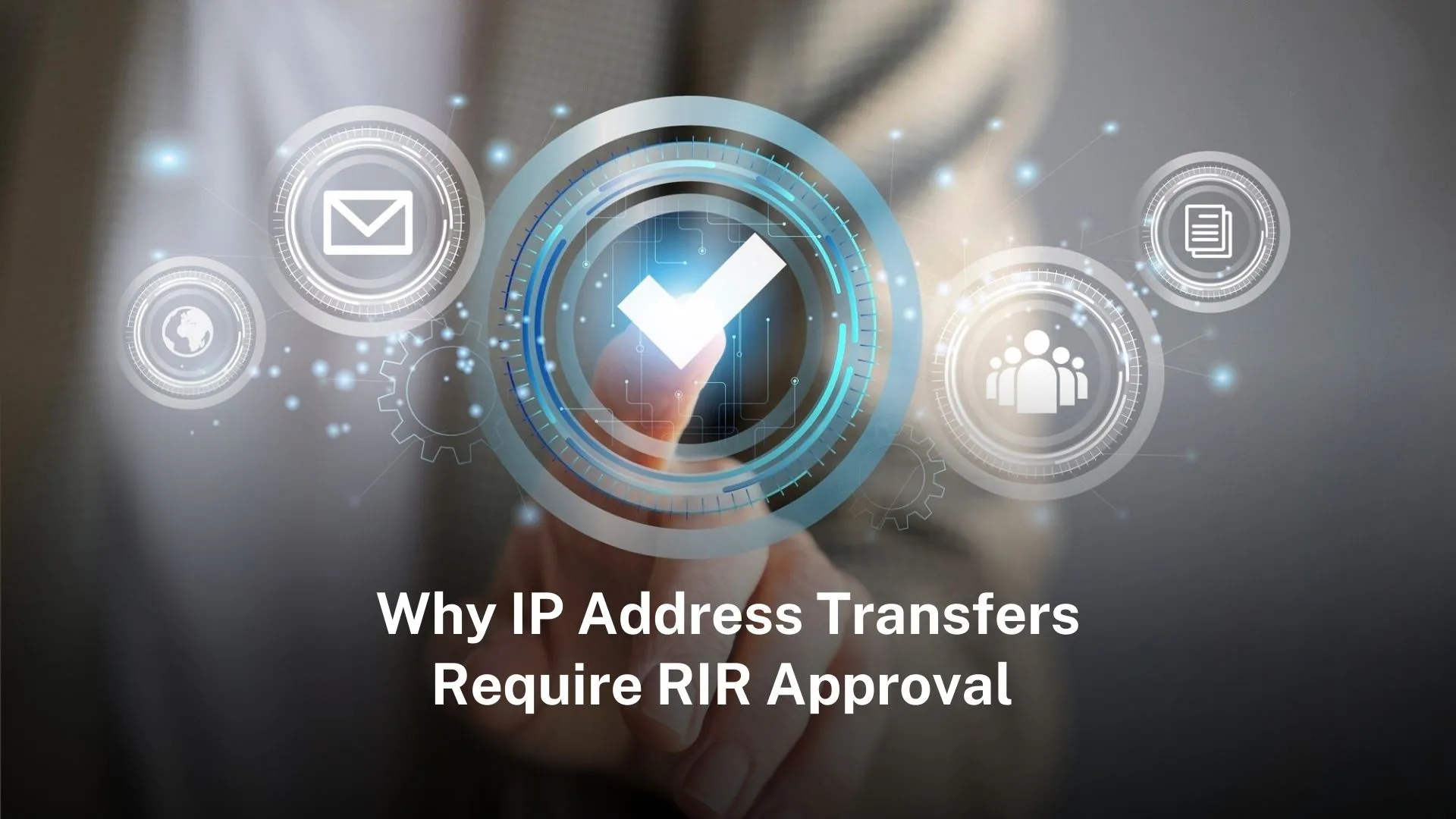Table of Contents
ToggleRIRs check if buyers need the addresses and sellers own them to stop fraud and hoarding.
Approval keeps the internet registry correct and helps resources go where they are used best.
What are IP addresses and why do they matter
IP addresses work like house numbers for devices on the internet. They let computers find each other and send data. There are two main types which are IPv4 and IPv6. IPv4 uses 32 bits and can make about 4.3 billion addresses. But people used them up fast because the internet grew big. IPv6 uses 128 bits and has way more addresses. Yet many groups still use IPv4 and need more. So transfers happen when one group gives addresses to another. But transfers can not just happen freely. They need approval from groups called Regional Internet Registries or RIRs.
These RIRs manage addresses in different parts of the world. There are five main ones which are ARIN for North America, RIPE NCC for Europe and the Middle East, APNIC for Asia and the Pacific, LACNIC for Latin America, and AFRINIC for Africa. RIRs started in the 1990s to handle address distribution. They follow rules made by the internet community. The rules make sure addresses go to those who need them and not get wasted.
Without rules the internet could have problems like duplicate addresses or groups holding too many without using them. And that is why transfers require RIR approval. It stops chaos and keeps things fair. Back in the early days addresses were given out easily. But as the internet got bigger supplies ran low. By 2011 the central pool at IANA ran out. IANA gives big blocks to RIRs. Then RIRs give them to users. When free addresses ended groups started transferring unused ones. But RIRs stepped in with policies. They wanted to check transfers. Because free markets could lead to high prices and big companies taking all. Small groups might not get any. So approval became key. It looks at if the buyer needs the addresses and if the seller can give them. This way resources stay useful. And the registry stays up to date. The registry is like a phone book for IP addresses. It shows who has what. If transfers happen without update the book gets wrong. Devices might not connect right. So RIRs make sure every transfer updates the book. They also check for fraud. Some might try to sell addresses they do not own. Approval stops that. It asks for proof like company papers or contracts. This builds trust. And it helps the whole internet work smooth. Groups like businesses or internet providers rely on this. They plan networks around addresses. Without approval plans could fail. Costs could go up. So the system protects everyone.
The history behind RIR approval for transfers
IP addresses started in the 1980s with no strict rules. The US government handled them through groups like IANA. But as the internet spread global RIRs formed to manage them locally. ARIN came in 1997. RIPE NCC in 1992. APNIC in 1993. They took over from IANA for their areas. At first they gave addresses based on need. You showed plans and got what you asked. No transfers because plenty were free. But by 2000s shortages showed. Predictions said IPv4 would run out. IANA gave the last blocks in 2011. RIRs like APNIC ran out first in 2011. Others followed. So communities made transfer policies. They allowed moves but with checks. For example ARIN added section 8 to its manual in 2009. It said transfers need approval to meet need rules. RIPE NCC added similar in 2008.
APNIC in 2010. The goal was to let unused addresses move but keep control. Without approval underground markets grew. People traded secretly with no guarantee. RIR policies prevented free transfers by not registering secret deals so markets stayed hidden with no title security for buyers but with shortages communities saw need for open processes and added policies. This made transfers legal but regulated. Approval came to ensure fairness. It stopped rich groups from buying all. And kept conservation. Conservation means using addresses well. Before run out it meant not giving too many. After it means moving them to users. But without checks hoarding could happen. Groups buy and hold for profit. Approval asks for use plans. For example buyers show 50 percent use in years. This keeps resources active. History shows approval evolved from need. Early no need because plenty. Now vital because scarce.
Why IP address transfers require RIR approval today
Transfers happen when a company has extra addresses and another needs them. But why not just sell like goods. Because addresses are not owned like property. They are rights to use. RIRs register them but users do not own. Courts said this in cases. For example in Nortel bankruptcy the judge let sale but after ARIN have many transfers since then and these have been supported by courts with language recognizing ARIN role in approval. So approval confirms the move fits rules. One big reason is to check need. Buyers must prove they will use addresses.
ARIN asks for plans showing 50 percent use in 24 months or 80 percent efficient use. This stops speculation. Speculation is buying to resell high. It drives prices up and hurts small users. Another reason is ownership proof. Sellers show they hold the addresses. RIRs check records. This prevents theft or fake sales. Fraud could mess the internet if wrong people control addresses. And uniqueness matters. Each address must be one only. Duplicate causes routing fails. Approval updates the whois database. Whois shows who has what. Wrong whois means hard to fix problems like spam or attacks. Security teams use whois to contact holders. So accurate records save time and money. Also approval handles types. Intra-RIR is within region. Inter-RIR between like ARIN to RIPE. Inter needs both approve because rules differ. ARIN has strict need. RIPE less now. But they coordinate. RIPE says transfers must be approved by both to process and resources stay under policies. This keeps global system linked. Without some regions loose others strict. Chaos. And policies evolve. Communities vote changes. Approval follows latest. For example after run out some wanted no need check. But most kept it for conservation. now that space is in wild there is greater need to practice conservation and loss of free pool does not end lifetime of public IPv4. So approval conserves. It makes sure addresses go to active networks not shelves. Economic side too. Without approval prices skyrocket. Brokers help but RIRs control.
How the approval process works in practice
The process starts with a request. For ARIN you log in online and pick transfer type. Types are merger or specified recipient. Merger when companies join. No need check but proof like contracts. Specified needs both sides submit. Pay fee like 500 dollars. ARIN checks docs. For need buyers give use history and plans. Officers sign letters. If ok transfer in days. But if not reasons given. You fix and try again. RIPE similar. For inter-RIR send email with template. Docs like registration and ID. They check due diligence. For natural persons passport verified. Confirmation letters signed. If from other RIR they wait for originate side. Then evaluate need if policy says. Plan for 50 percent use in five years for some. APNIC uses template too. List resources and dates. Source starts if outbound. Recipient justifies when asked. Pre-approval helps. In APNIC you get ok before find seller. Lasts two years. Shortens time. All RIRs have fees. Small for process. And rules on size. Minimum /24 which is 256 addresses. Stops tiny fragments hard to route. And waits. ARIN source can not get new for 12 months before transfer. And waitlist bans. If you transfer you off waitlist for free addresses. This stops flippers who get free and sell quick. Process takes weeks to months.
Depends on docs. Brokers help with papers. They know rules. But RIR final say. Examples show it works. Microsoft bought from Nortel in 2011. Court ok but ARIN involved. They signed agreement. Transfer approved. Many since. In RIPE transfers rose after policy. From few to hundreds. Addresses millions moved. But all checked. This keeps market stable. Prices around 50 dollars per address now. Without approval maybe higher. And leasing grew. Leasing is rent not transfer. Some do to avoid approval. But RIRs watch.
Differences in RIR policies for transfers
Each RIR has own rules but similar goals. ARIN strict on need. Recipients show use. No transfer if got recent. Inter with APNIC RIPE LACNIC but not AFRINIC. RIPE allows after 24 months hold. Legacy different. Legacy are old before RIRs. Can transfer with less check but still approve. RIPE focuses on region use. At least one element in area. APNIC needs compatible policy for inter. With RIPE ARIN LACNIC ok. Justify need. Pre-approval popular. LACNIC similar to ARIN. AFRINIC has transfers but no inter yet. Differences cause shopping. Groups pick easy RIR. But rules stop. You need presence in region. there is notion of some RIR shopping. But RIRs talk to block. Policies change. RIPE had debate on no need. free pool gone so no conservation via need but market. But failed. Most want check. ARIN keeps strong. APNIC balances. This variety shows community decide. Approval adapts local. But global harmony needed. ICANN oversees but RIRs run daily.
The benefits of requiring RIR approval
Approval brings many good things. First fair access. Small companies get chance. Without big buy all. Need check levels field. Second security. Checked transfers mean less risk. Fraud down. Whois right helps fight crime. Teams trace bad acts fast. Third efficiency. Addresses used not idle. Plans ensure active. Economy grows better. Networks expand right. And transparency. Open process no secrets. Prices fairer. Brokers quote based on approve. Paul Wilson noted with policies transfers legitimate and transparent. Before hidden risky. Now safe. Also pushes IPv6. Hard transfers make people think new. IPv6 unlimited. But IPv4 comfort. Approval adds cost time so incentive. Global coord. Inter transfers work because approve both. No conflict. And community input. Policies from users not top. Meetings vote. Like ARIN meetings. This democracy. Benefits all.
Challenges and criticisms of the approval system
But not perfect. Some say too slow. Weeks wait hurts business. Urgent need delayed. And cost. Fees docs lawyers add up. Small groups struggle. Bureaucracy. Tore Anderson argued no reason for complicated expensive process. Market better. Prices conserve. High price stops waste. Milton Mueller said market rational fair than admin. And leasing rises because avoid. Rent no approve. But whois wrong. Risk. RIRs worry. Correlation leasing whois inaccuracy. So shadow market. Also differences cause confusion. ARIN strict RIPE easy. Groups move. But need local. And legacy special. Old holders less rules. Some sell easy. Unfair. Courts challenge. Nortel case showed. Judge ok but ARIN involved. Future cases may test. Microsoft-Nortel recognized value formalized buy sell. But constrained. Challenges exist but system adapts.
Why IP address transfers require RIR approval in inter-regional cases
Inter-RIR transfers cross borders. Need both approve. Why because regions differ. Policies not same. ARIN needs based. RIPE post depletion less. Approve ensures compatible. APNIC says policy requires other RIR compatible. Start at source. Then destination checks. Docs shared. Like company info contacts. This coordinates. Prevents one side loose leak to strict. Resources stay managed. And global uniqueness. Transfer wrong could duplicate. Approve sync registries. Examples ARIN to RIPE common. Businesses expand Europe. Approve both. Time longer. Different zones. But works. Benefits connect world market. Extra addresses move where needed. Asia short Europe some extra. Transfers balance. But checks prevent drain. Without one region empty.
The future of IP transfers and RIR roles
As IPv6 grows transfers may drop. But IPv4 lasts years. Dual stack common. So approval stays. Policies may relax. Debates continue. Like no need. But conservation key. Chris Grundemann argued greater need now for conservation. Tech changes. 5G cloud need more. RIRs adapt. More pre-approve. Faster online. And API for brokers. But core approval remains. To protect resource.
FAQs
What is an RIR and why do they approve IP transfers?
RIRs are groups that manage IP addresses in regions. They approve transfers to check need, ownership, and keep records accurate so the internet stays stable and fair.
How long does RIR approval take for a transfer?
It takes weeks to months. Depends on docs and type. Pre-approval can speed it but full check needs time for review.
Can I transfer IP addresses without RIR approval?
No because without approval the registry not update. Addresses may not work right and it risks fraud or disputes.
What happens if a transfer request is denied?
RIR gives reasons like no need or bad docs. You fix issues and resubmit. Or appeal through community process.
Are there costs for RIR approval in transfers?
Yes fees like 500 dollars in ARIN. Plus broker or lawyer costs. But needed for legal safe move.





Fine for you my guides,, nevertheless thank you so much because you did for me
I’m still learning from you, while I’m improving myself. I absolutely liked reading everything that is posted on your site.Keep the tips coming. I liked it!
Quality content